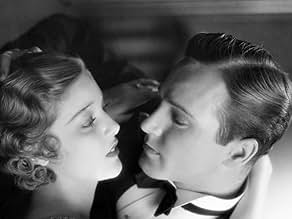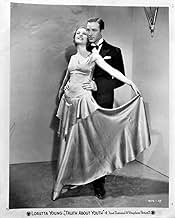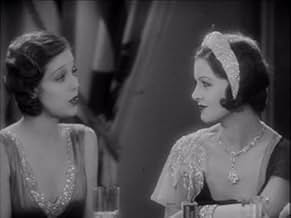Adicionar um enredo no seu idiomaRichard Carewe has raised his deceased friend's son from childhood with the help of his housekeeper and her beautiful daughter Phyllis. He arranges a marriage between the lad and Phyllis, bu... Ler tudoRichard Carewe has raised his deceased friend's son from childhood with the help of his housekeeper and her beautiful daughter Phyllis. He arranges a marriage between the lad and Phyllis, but the rascal impulsively marries a notorious nightclub singer known as "The Firefly." The ... Ler tudoRichard Carewe has raised his deceased friend's son from childhood with the help of his housekeeper and her beautiful daughter Phyllis. He arranges a marriage between the lad and Phyllis, but the rascal impulsively marries a notorious nightclub singer known as "The Firefly." The femme fatale dumps the boy when she discovers that he has no money, but by then Phyllis re... Ler tudo
- Direção
- Roteiristas
- Artistas
- Jim - Kara's Boyfriend
- (não creditado)
- Headwaiter
- (não creditado)
- Nightclub Patron
- (não creditado)
- Babette - Kara's Maid
- (não creditado)
- Nightclub Patron
- (não creditado)
- Nightclub Patron
- (não creditado)
- Hal - Dane's Pal
- (não creditado)
- Jim Greene
- (não creditado)
- Night Club Patron
- (não creditado)
- Cherry - Blonde Party Girl
- (não creditado)
- Man at Wedding License Bureau
- (não creditado)
- Direção
- Roteiristas
- Elenco e equipe completos
- Produção, bilheteria e muito mais no IMDbPro
Avaliações em destaque
This light piece of early sound Warner Brothers is between so many different worlds. It's between the roaring twenties and the Great Depression. The roaring twenties are over but the poverty of the 30s have not yet arrived. Thus you have a night club and act worthy of the roaring twenties. And nobody after the roaring twenties would have continually called a grown man "The Imp" (David Manners' character) versus his right name.
It's between two wars - the two world wars, and so you have a trio of men who appear to have had their friendship founded in the military - though they never come out and say so. The dead friend they continually refer to - heck, Conway Tearle's character has been raising his son for 15 years! - probably died in military service, thus the debt they feel and the reason all three consider themselves the lad's wards. It's far enough away from WWI at this point that one can speak of war somewhat romantically.
This film is also between the silent and sound eras. 1930 was actually the first full year of talking films, and the industry hadn't yet quite gotten down the art of doing sound film. Thus there is an over powering score that drowns out conversation in some parts, and there is absolutely no score in others to the point that I expect to hear crickets chirping.
Then there is their choice of stars during this transitional period. Of course, Loretta Young at 17 does a grand job and she had a career that straddled both the silent and sound eras. David Manners may be unfamiliar today, but he was the juvenile lead in practically every film made until 1936, when he suddenly retired. The odd bird in the cast has to be Conway Tearle in the lead as a man trying to save his ward , "the Imp" from a gold digging temptress (Myrna Loy). Tearle had a good voice, and in the early sound era that was enough to get you leads for a couple of years. Tearle had the good fortune to be the lead in Warner Brothers' biggest hit until Robin Hood in 1938, that being 1929's "Gold Diggers of Broadway". Unfortunately, physically, Tearle was so non descript that career criminals would have killed to look like him - He is just so neutral in his features that he is impossible to describe. Once more distinctive actors begin to arrive on the scene such as Cagney and Gable, Tearle was pretty much out of leading roles.
Finally let me say something about Myrna Loy. She plays here, as she often did at her time at Warner Brothers, the exotic temptress. In this case she is Kara, "The Firefly", the star of a nightclub act wo wants to marry David Manners' "the Imp" for his money which he doesn't happen to have.. She is spotlighted singing songs not written for her with a singing voice that is not hers either. I'm sure she was grateful to find a home at MGM where she spent a good part of her career playing normal people, gaining the slogan - "Myrna Loy, so nice to come home to".
* 1/2 (out of 4)
Incredibly flat and lifeless drama about an older man (Conway Tearle) who raises a boy (David Manners) as his own in hopes that he will marry the housekeeper's daughter (Loretta Young). The only problem is that the boy falls in love with a "much older" vamp (Myrna Loy) who plans on stealing all of his money. Young is my favorite actress and I'm a big fan of both Manners and Loy so this film comes as a major disappointment because it starts off lousy and gets worse as it goes along. The biggest problem with this thing, and there are many, is that the screenplay is so old-fashioned that it doesn't fit in with the type of entertainment coming out in the 30s. Why the studio would pick this type of story to make a talkie out of is beyond me because I can't imagine anyone enjoying it in 1930 and it's even worse today. The screenplay is one big moral lesson after another as we're constantly told why we should marry the girl out home instead of going out in the big, bad city where mean women are waiting to steal money. The narrow-minded stereotypes here are at times mildly laughable but things take an even dumber turn when the ending arrives and if you think about what's going on it becomes rather creepy. I also find it funny that the studio had Loy playing the "much older" seducer even though Manners was actually four years older than her in real life. The early talkie makes for some pretty bad moments as it seems there are a few times where the actors mess up their lines because we get a brief pause like they're trying to remember them. The weird camera shots and some static direction doesn't help things either. I think fans of the three, like me, will probably find the performances rather disappointing as well. Just take a look at the early scenes where Manners is playing drunk and you'll probably end up laughing at how stiff he is. It's even worse when a letter is discovered and Manners' fears that Young has discovered his secret. The way Manners stands there with his eyes wide open is just plain bad. Loy is so-so in her part but there's no denying that she's much too young to be playing it. Young has a few rough moments but she comes off the best as she's certainly believable in the part and we can certainly feel for her. She might also have the highlight in the opening scene as she's shown in a dress is quite a sexual way. With all of that said, this is an extremely dull movie that has very little going for it and I'm sure many will have a hard time sitting through the rather short 64-minutes.
It's a 1930 movie, so it's a little stiff and stagy, in production and acting. Loy is wonderful, like a breath of fresh air whenever she's around, glittery and sexy and dangerous. Manners is his usual rather awkward self (when he's staring with lust at Loy, he looks rather like Harpo Marx during his drunk scene in THE COCOANUTS) but he has the leading man looks needed for the part. Young is not as good as she would be in later movies; both she and Tearle are rather stiff. The characters could be fleshed out a bit more; all the exposition is crammed into a long dialogue scene in the first ten minutes of the movie. I would particularly recommend this to Loy fans-it's always fun seeing her as a kind of femme fatal (as she was in several of her early films) and contrasting that image with her good-girl/wifely image later in her career.
Você sabia?
- CuriosidadesMyrna Loy was actually a fully trained professional dancer, having studied with Ted Shawn (husband of modern dancer Ruth St. Denis and co-leader with her of the Denishawn company), but "The Truth About Youth" and Warners' all-star musical "The Show of Shows" were among the few movies in which she actually got to dance.
- Erros de gravaçãoDuring Kara's first number at the Firefly Club, she purses her lips and blows a kiss to someone in the audience. It is an obvious lip-sync as she is still heard singing while doing that.
- Citações
Phyllis Ericson: It's about time I began. What chance does a girl nowadays, if she doesn't do this and won't do that?
- ConexõesFeatured in Myrna Loy: So Nice to Come Home to (1990)
- Trilhas sonorasIn the Land of Let's Pretend
(uncredited)
Music by Harry Akst
Played during the opening credits
Also played when Phyllis is sitting with Dick and Kara at the Firefly
Also played when Phyllis and Dick are alone at the end
Principais escolhas
Detalhes
- Data de lançamento
- País de origem
- Idioma
- Também conhecido como
- When We Were Twenty-One
- Locações de filme
- Empresa de produção
- Consulte mais créditos da empresa na IMDbPro
Bilheteria
- Orçamento
- US$ 153.000 (estimativa)
- Tempo de duração
- 1 h 9 min(69 min)
- Cor





































